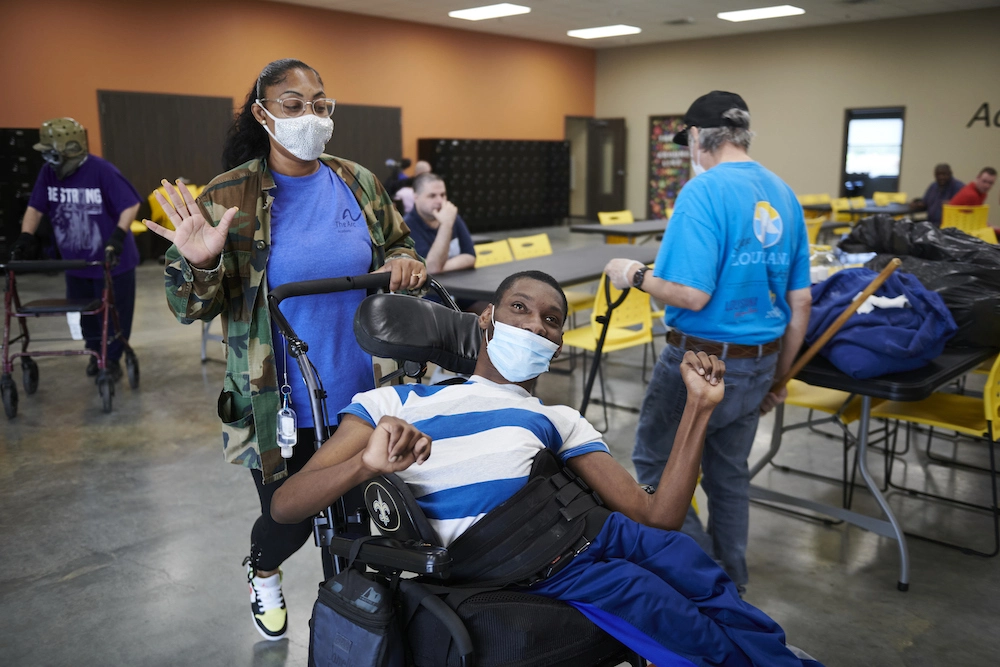You want to provide your adult child or family member with the best life possible. For most of us, that means a life full of activities that we enjoy, assorted friends, social interaction, a sense of purpose and positive learning experiences that together build confidence and independence. Meanwhile, you want to be able to keep your family together, and you want to be able to live your own best life as well. A quality day program for adults with disabilities has the potential to fulfill all of these objectives. The challenge is in finding the right program, the one that will be good for your loved one, you and your family.
Unique Needs of Adults With Developmental Disabilities
The term “developmental disabilities” covers a lot of territories. Cognitive challenges can affect or slow someone’s ability to learn, make accurate judgments, understand a situation or remember basic information, for example. Physical issues may affect not only balance, coordination, and both gross and fine motor skills but also include medical conditions. Individuals may not be able to communicate verbally and may need to use alternative technology or signing, for example, to express themselves. Behavioral mannerisms, emotional maturity and self-control also can be significant factors.
Add individual personalities and preferences to the mix, and the ways in which developmental disabilities manifest are unique to each person and their set of circumstances. What this means is that while one particular program may work well for some, you and your family must search out the program that fits your particular family member’s needs best.
Asking the Right Questions About Disabilities Day Programs
As you’re considering options, you want to be clear in your own mind about your loved ones limitations, capabilities and interests. Further, your adult child or family member should be involved in the decision-making process as much as possible. A successful pairing is more likely when the person who will actually be attending the program is able to provide input.
When you’re looking at day programs for adults with disabilities, you want one that will be able to serve your particular loved one’s needs in positive ways; ways that make them happy, keep them safe, help them grow in confidence and encourage greater levels of independence. So, as you visit facilities and speak with program managers and caregivers, you both need to ask questions that will translate into realistic expectations that you’re both comfortable with.
1. What types of activities are provided on a daily basis?
You should be able to get a sense of how days are structured and the resources and scheduling that the facility has in place. Well-managed programs try to maintain an appropriate balance among caregiving routines, the teaching and practice of skill sets, enrichment activities and free time when individuals can pursue personal interests. Activities should be tailored to participants’ capabilities, needs and interests. Many programs will also offer options to learn job-related skills or provide opportunities for employment
2. How are attendees grouped throughout the day?
Social interaction is often a key objective for people attending a day habilitation program. Even when attendees are engaged in structured activities or involved in personal care, a social dynamic is present. However, some people may need heightened levels of interaction that would be overwhelming to another person. Again, you’re looking for a balance between small or large group activities versus personal or individual attention.
3. How are caregivers assigned, and what are their competencies?
Caregiver-to-attendee ratios should correspond to the level of care and assistance that person needs. The more caregivers there are, the greater the opportunities for personalized assistance and learning. More caregivers may also allow greater flexibility in pairings or groupings if conflicts arise. Equally important are the training qualifications and certifications that caregivers hold. Especially if your person has unique limitations or needs, you want to be sure that caregivers have the appropriate training and resources to handle them.
4. How do you accommodate extreme disabilities within your program activities?
If your adult child or family member is non-ambulatory, is nonverbal, has hearing or visual issues, has seizures, is incontinent or becomes easily fatigued, for example, you’ll want to ask questions specifically geared toward their needs. What resources are in place at the day habilitation program facility to ensure comfortable inclusivity day to day, and what provisions are in place for special outings and day trips?
5. What kinds of day trips do you arrange, and how often do you take attendees on outings?
Most day habilitation programs arrange regular day trips and outings that are both fun and educational for all participants. It may be a day at the park with a picnic lunch, several hours volunteering with a local charity organization, or a visit to a nearby historical site or new entertainment venue, for example. Be sure to inquire about the frequency of outings, transportation, accommodations and personal assistance available to those with extreme disabilities. Exclusion or having to deal with embarrassing situations in a public setting can be extremely distressing.
6. Is daily transportation to and from the program facility available?
Especially in rural areas, program facilities may serve extensive geographical areas. Some programs manage door-side pickup and drop-off services. You’ll want to ask about service reliability, driver qualifications and specialized accommodations. For example, is a lift in place for non-ambulatory riders, or will the driver or caregiver be able to assist a nonverbal passenger?
7. How do you deal with noncompliance, de-escalate conflict and handle medical emergencies?
While we’d like to think all moments will be golden in the perfect program setting, human beings are only human. Conflicts may arise simply because individuals are tired, hungry or over-stimulated. Medical emergencies may arise due to slips and falls, for example, or a physical condition. What strategies and resources are in place to de-escalate stressful situations or handle medical emergencies quickly and appropriately? These questions are all important because they address how a program values its participants’ physical, mental and emotional well-being.
8. Are lunches, snacks or other supplies included, or must I provide them?
Food needs can be highly individualized, so while some programs may provide food, others may ask that you provide a packed lunch and snacks for each day. Facilities may also ask that you supply any personal hygiene items needed as well as a change of clothes that can be kept onsite.
9. What policies are in place regarding family involvement, questions and concerns?
While we’d like to think that everything will always go smoothly if we just find the right program, the truth is that acclimating to a program may take a little work and time on everyone’s part. It is completely appropriate and acceptable to ask questions in advance:
- What level of family involvement does the program encourage, and what does that look like?
- What if my adult child or family member does not feel comfortable with a particular caregiver or activity?
- How do you handle conflicts between program attendees?
- Who should I speak with if I have concerns about my adult child/family member’s daily participation or needed services?
At first, the thought of finding the right day habilitation program for your adult son, daughter or family member may feel overwhelming. However, as you tour facilities and speak with program managers and their staff, you’ll see just how hard caring individuals are working to ensure that their clients are happy, well-cared-for, and busy learning new skills and enjoying levels of independence that they might not master otherwise.
Arc of Acadiana has wonderful day programs for adults with developmental disabilities and should be on your short list of programs to consider. If you’d like more information, please don’t hesitate to reach out through our website or give us a call.

